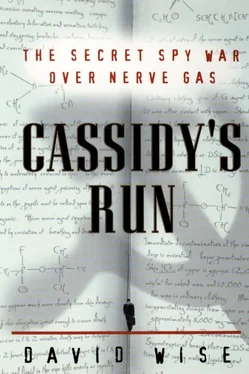Abroad, the CIA overthrew the governments of Iran and Guatemala and attempted unsuccessfully to unseat President Sukarno in Indonesia. The Soviets, meanwhile, crushed the revolt in Hungary, maintaining their grip on Eastern Europe.
It was a time of spies, of secret battles fought in the shadows, and not only in distant places such as Vienna and Berlin. The American public read about a series of sensational Soviet espionage cases in the United States itself, including the arrest, conviction, and execution of the “atom spies,” Julius and Ethel Rosenberg.
In this cold war environment, the FBI under J. Edgar Hoover was not content merely to detect and catch Soviet spies; when possible, it tried to run agents against them. Thus, in 1958, the FBI and the army began planning what eventually became known as Operation SHOCKER. [1] The code name changed over the years, partly for reasons of security but also to distinguish various phases of the case. The operation’s first code name was CHOWLINE. Later, both the FBI and the army used the code name ZYRKSEEZ (the phonetic spelling of Xerxes, the Persian king who ruled in the fifth century B.C.).By 1971, the code name SHOCKER had been adopted by the Joint Chiefs of Staff, and the same year the FBI chose the code name PALMETTO for the University of Minnesota professor in what became the final stage of the long-running affair. Also in 1971, the FBI coined the code word IXORA for a startling offshoot of the case. To avoid unnecessary confusion, the operation is generally referred to here as SHOCKER, the name used at the highest level of the Pentagon, although it was not a cryptonym used by the FBI.
In those years, the FBI had a classified program known as DESECO, for Develop Selected Contacts. The purpose was to develop sources who could provide information about the targets of the KGB, the GRU, and other East-bloc intelligence services.
According to Charles Bevels, an FBI agent who ran SHOCKER for several years, the case originated under the DESECO program. “The FBI interest,” Bevels said, “was to identify the contacts made by the Soviets. If we could turn the contacts around to work for us, that was to our advantage. But, in addition, under the program certain people were selected to be put into contact with the Russians.”
Because the double agent passes genuine classified information, even though the documents have been cleared for that purpose, his handlers want some benefit in return. One reason for transmitting real secrets, of course, is to convince the opposition that the agent is trustworthy. In turn, that opens up the possibility of a grand deception, of eventually slipping in bogus documents, false information designed to mislead and confuse an adversary government.
Inside American intelligence agencies, operations of this kind are known variously as deception, double-agent, or counterespionage operations. [2] There are some nuances and differences among the various terms. Not every double-agent operation, for example, involves transmitting false information to an adversary service.
In the1990s, the FBI’s National Security Division, in its internal documents, more often used the term “perception management” to describe these operations.But this latest term of art boils down to the same thing as its predecessors—tricking an adversary into believing false information by persuading it that a source is selling America’s secrets.
The central purpose of Operation SHOCKER was to build up to a major deception of the Soviet Union. In addition, SHOCKER had several other objectives: to learn the identities of the GRU’s officers in the United States; to discover how it recruited Americans as agents, and how it ran them; and, by the questions the Russians asked of the source, to learn what gaps existed in the Soviets’ knowledge of the American military.
The FBI also hoped that the operation might flush out Soviet “illegals”—spies operating without benefit of diplomatic cover. Intelligence officers working out of the Soviet embassy in Washington, the Soviet mission to the United Nations in New York, or UN headquarters, could be watched and their contacts sometimes identified. Illegals, by contrast, are normally almost impossible to detect, since they can be anywhere and blend in with the general population. But an illegal put in contact with WALLFLOWER might be spotted and identified.
From the FBI’s perspective, there was one other fringe benefit to the operation. The GRU agents occupied with running an agent under FBI control had less time to spot and recruit real spies.
According to Phillip A. Parker, a former senior FBI counterintelligence official who played a key role in Operation SHOCKER, another advantage the bureau gained from a counterespionage operation, even if the Russians eventually caught on, was that “dangles… make them suspicious of the real guys—the real walk-ins.”
Every double-agent operation, however, carries within it a risk. For the most part, real secrets are given away to the opposition, information that could prove harmful to the United States. Ideally, a delicate balance is maintained between the risks and the benefits.
In Operation SHOCKER, the FBI was responsible for all operational aspects. Together with the army, the FBI screened and selected a military man to be dangled to the Russians. The bureau ran the agent. The army provided the agent as well as the “feed”—the classified materials to be released. Within the Pentagon, an elaborate system of secret panels reviewed the feed. Ultimately, the Joint Chiefs of Staff approved the documents given to the Russians. The entire procedure was supersensitive and highly secret.
After months of planning, and a good deal of pulling and hauling between the bureau and army intelligence, the FBI was ready to move. Early in 1959, Joe Cassidy was told by his commanding officer at Belvoir to report to a meeting at the post library.
“When I got up there, there were twenty-five to thirty other top-grade sergeants, and I thought, What’s going on here? Somebody said, ‘I think it’s a security problem.’ We were called in one by one. There were two civilians there.
“They asked me how long I’d been in the army, what my name was, where I worked. Just general things like that.” Cassidy was puzzled by the odd interview.
“About two days later, I was told to report to the intelligence office. The same two civilians were there.” As Cassidy later found out, the two men across the table were Donald A. Gruentzel and John Buckley, both special agents of the FBI. Gruentzel, the lead agent, was a stocky, sandy-haired Midwesterner known around the bureau as “Gruntz” or “Madman,” the latter sobriquet a tribute to his aggressive driving style.
Gruentzel has been credited by his counterintelligence colleagues with creating Operation SHOCKER and recruiting Joe Cassidy as its star actor. Gruentzel was not a man who talked much about himself, but he was respected as a very tough agent. He earned a law degree at Creighton University, in Omaha, and had joined the bureau in 1951. His father had worked in a restaurant, and Gruentzel loved to cook. “Nothing fancy,” said one FBI man, “Gruntz was a meat-and-potatoes man. He could cook dinner for two dozen people or fifty people.”
Like Charlie Bevels, Gruentzel and Buckley worked out of the FBI’s Washington field office on the S-3 squad, the counterintelligence unit that monitored the GRU. [3] S-2 was in charge of counterintelligence against the KGB in Washington. S-1, known informally as “Deep Snow,” handled Soviet cases of especial sensitivity. All three squads were supervised by Ludwig W. R. Oberndorf, “Obie” to all in the bureau.
Cassidy was puzzled at first by their questions. “They started asking had I ever played volleyball.” The FBI, as it turned out, had come to the right man. “In my early days as a first sergeant at Fort Lee, Virginia,” Cassidy recalled, “my Company E would play A Company in volleyball. We played for a case of Coke for every three games won. A Company ended up owing us some fifteen hundred cases of Coke.”
Читать дальше












